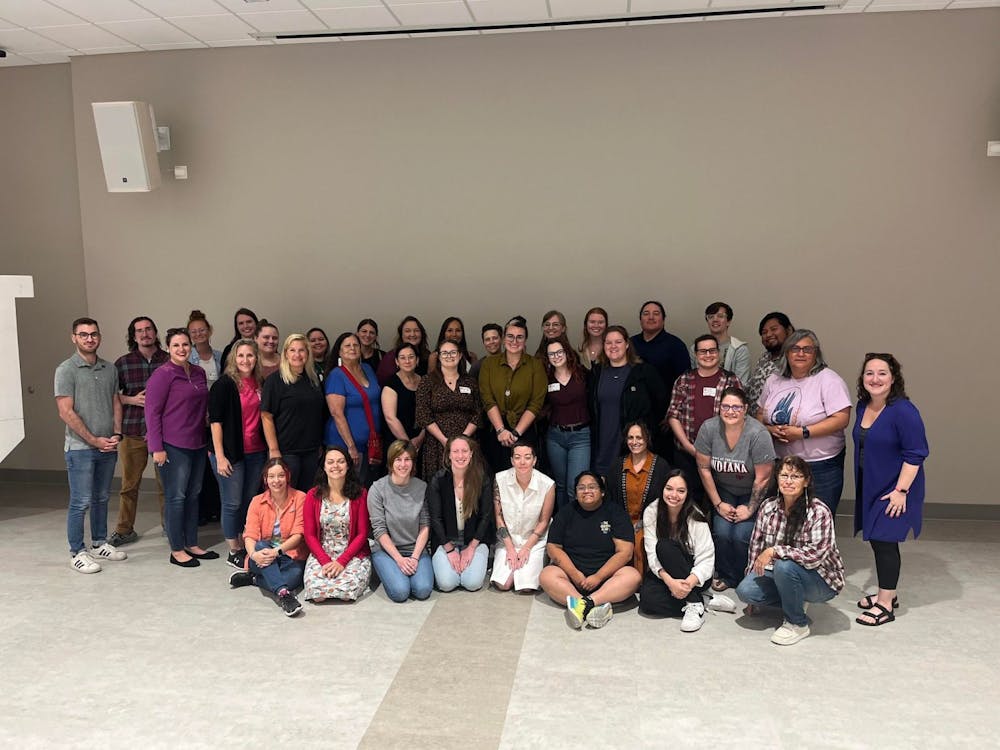Two years after a ProPublica investigation found IU held the fifth largest collection of unrepatriated Native American remains in the US, the IU office responsible for returning those remains and cultural items has completed four more repatriations.
The IU Native American Graves Protection and Repatriation Act office works to review and return the thousands of Native American remains and funerary objects still in IU collections. It does so in accordance with NAGPRA, a 1990 law requiring federally funded institutions to repatriate the human remains or items held in their collections to their tribal nations of origin.
A ProPublica report updated in January says that IU’s original holdings included 6,100 remains, and IU has completed inventories, the first step towards eventual repatriation, for 1,640 of those remains. Jayne-Leigh Thomas, director of the IU NAGPRA office, said the original number was closer to 5,200 remains, and the office has repatriated from that number.
NAGPRA seeks to address centuries during which museums, federal agencies and universities routinely dug up Native American gravesites for display or for research that often amounted to pseudoscience. This desecration of sacred areas and gravesites contributed to the attempted eradication of Native American cultural practices.
IU obtained its collections through donations from museums, universities or private donors, or through excavations beginning in the 1930s.
An IDS investigation in 2023 found a loophole in NAGPRA allowed IU, along with other institutions across the country, to go decades without repatriating any of the remains in its collections. Current and former faculty alleged at the time that IU avoided the responsibility and pushed the work to untrained anthropology faculty with full-time research and teaching responsibilities.
Updates to NAGPRA regulations closed that loophole in 2010. Three years later IU hired Thomas, who has a PhD in Archeology from the University of Edinburgh, to direct its NAGPRA office.
Since then, ProPublica says the office has completed inventories listing possibly affiliated tribal nations for 1,640 of the remains in its collection.
Thomas said those lists could include upwards of 50 tribal nations for a given set of holdings or remains.
Once an institution determines the possible tribal affiliation of a set of ancestral remains or cultural items, regulations require institutions to consult — virtually or in person — with representatives from tribal nations. But that can take time.
“Consultation requires the development of a relationship,” Thomas said. “That's not something that can happen overnight.”
In 2019, Martha Only A Chief, the NAGPRA coordinator with the Pawnee Nation of Oklahoma, visited IU to determine the affiliation of several cultural items in IU’s collections. She said the in-person consultation allowed her to fully assess whether those items were Pawnee.
“There are certain items where, when they have an inventory, it’ll just say rattles,” Only A Chief said. “Well, a rattle can mean a number of different things, but ours, we have certain rattles that are used in our sacred ceremonies or sacred dances, and some of them that we still use.”
That consultation resulted in IU repatriating 27 cultural items to the Pawnee Nation last November, allowing Only A Chief to bring certain items back for eventual display in the Museum of the Pawnee Nation, where tribal members can see them for the first time.
“The reason, I feel, for my job, is to bring these items back so our people could see them, and our, you know, our children and grandchildren after that,” Only A Chief said.
Thomas said during the consultation process she accommodates the needs of tribal representatives, who may be too busy to start new repatriations or accelerate existing projects.
Only A Chief said the workload for tribal nations has increased since January last year, when revised NAGPRA regulations went into effect and added multiple new deadlines for institutions to file inventories and contact tribal representatives.
Since then, the number of institutions reaching out for consultations has skyrocketed. Two years ago, Only A Chief was handling two to five consultations. Right now she’s handling 34, with more requests waiting in her inbox.
Thomas also said tribal nations also may need time to find reburial land for holdings that include ancestral remains, so that collections can be removed from campus and reburied once repatriated. Thomas said she doesn’t try to rush that process.
“It would be disrespectful to treat the ancestral remains as just objects you're trying to hurry up and get out the door,” Thomas said.
As an enrolled member of the Chaui band of the Pawnee Nation, Only A Chief said she has helped rebury the remains of her ancestors in Nebraska, on land owned by the Pawnee Nation.
“They don't have to be on that shelf in that box in plastic, or however they were before I was able to take possession and bring them to Nebraska and put them back into Mother Earth,” Only A Chief said. “That's what gratifies me.”
In 2023, Only A Chief attended the first annual Intensive NAGPRA Summer Training and Education Program, a week-long NAGPRA training program co-led by IU and UIUC.
INSTEP teaches attendees to navigate the legal, political and ethical aspects of NAGPRA work. Previous programs have accepted 40 participants a year, with both domestic and international applicants, and offered travel scholarships for tribal participants.
Krystiana Krupa, the senior program officer for NAGPRA at UIUC, worked for Thomas as a research assistant while earning her masters in anthropology at IU. Krupa said she and Thomas planned INSTEP in response to an increasing — and often unmet — demand for formal NAGPRA education.
Krupa said it’s uncommon for universities to teach courses on NAGPRA, and the available classes often last only one or two days. Krupa also said universities often assign work to faculty without prior experience or training, which can slow the process down.
“You might be in a position where you suddenly have to figure out how to interpret a law, a federal law, on behalf of an institution that you are representing when you're speaking directly with tribal governments, which are sovereign nations,” Krupa said. “And so it's also a political process.”
Thomas said the first INSTEP program received 94 applicants, more than four times the number she expected. The program’s second year received over 111 applicants.
“It just really shows that there's a need for NAGPRA training,” Thomas said.
Thomas said she’s planning a 3-day training for tribal practitioners in October, hosted by the Miami Tribe of Oklahoma, which co-hosted the National NAGPRA Committee Meeting with IU in 2023. She has also spoken with colleagues about the possibility of developing more educational opportunities at IU for students interested in learning about repatriation.
“We could develop a certificate that would be perhaps either through the law school or SPEA, or perhaps something collaborative that could be offered for people who are wanting to learn a little bit more about repatriation,” Thomas said.
Meghan Buchanan, an associate professor in anthropology at Auburn University, collaborated with the IU NAGPRA office while working at the Glenn Black Lab prior to 2016. At Auburn University, Buchanan has run multiple job searches for NAGPRA positions, and she said the applicant pool is steadily growing.
Buchanan said the increased interest in NAGPRA represents a shift in how anthropologists and archaeologists view their work.
“Descendant communities and local communities’ concerns and needs are being brought to the forefront of doing archeology,” Buchanan said.
Buchanan said the field of archeology is also evolving a new approach to NAGPRA compliance in areas of research.
“We want to do things right,” Buchanan said. “We want to follow the law. We want to embrace the spirit of the law.”
Thomas said she hopes institutions take NAGPRA as a roadmap for international repatriations, which are not included under the act’s requirements.
Gabrielle Goodwin, who works in cultural heritage law and policy at the Maurer School of Law, said she’s spoken with Thomas about the possibility of collaborating with IU Global Gateways to host a conference abroad, which Goodwin said could offer NAGPRA training while boosting public awareness.
In March, IU completed its first international repatriation to the Rapa Nui people of Easter Island. During that repatriation Thomas worked with Francisco Nahoe, a Catholic priest and Franciscan friar, who is a delegate for the Te Mau Hatu, the Easter Island council of elders, for recovery and repatriation.
Nahoe said institutions need to take a broader approach to repatriation than what is required in the NAGPRA regulations.
“In that respect, IU understands what I’ve called the ethos of repatriation,” Nahoe said. “Which is, to be clear, not repatriation that is compelled by statute, but rather repatriation that is compelled by moral obligation and nothing else.”






